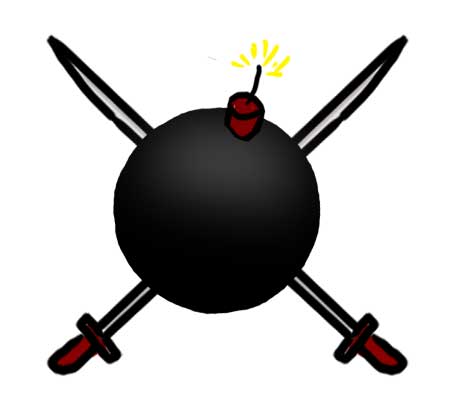“I married my wife because 1) she’s beautiful 2) she makes me strive to be better each day. Surround your personal life and business life with people that force and empower you to be better.”
You may not think that having a business partner is for you. This is how Allan felt. Allan had been running his own consultancy just fine. His dad (who has been a successful entrepreneur for decades) told him not to get a business partner. Then Allan met Steve in the summer of 2006...
Steve could take one of Allan’s ideas and instantly be able to tell him why it was bad and how to make it better. It was quickly apparent that Allan was better at his job with Steve around. Steve also could do things that Allan couldn’t. Allan was the idea factory. Steve made the ideas better. Today, that formula makes a great duo. Find the person that makes you better. Find your Steve.

A business partnership is a marriage (nothing sexual). It’s a marriage in the sense that you are joined. Allan’s life decisions affect Steve. If Allan were to spend lavishly and get over his head financially, he could need more every month than the business can afford (or more than they had budgeted). This could put a strain on the business and put the partnership at risk. When Allan was thinking of purchasing the current “Casa de Branch,” he ran the numbers with Steve just so he could double check that he wasn’t being irresponsible with his money.
Allan and Steve have a unique business relationship. Here is how they make it work:
They are both keenly aware of the fact that they do better together than they do apart. They collaborate wonderfully together. A few select times, this knowledge has been the only thing that kept them together.
Neither of them steers the ship alone. They are able to make corporate decisions together in a mutually agreeable way. If they can’t agree, the decision gets put off until they find a compromise. This is how it works 100% of the time. It’s just another way they show respect for one another.

Having shared ethics and values makes for a shared compass of decision- making. It allows Allan and Steve to have a mutually agreed-upon starting point for persuading each other.
Ultimately Allan and Steve want the same things from their life, their business, their employees, and their products. These non-competing interests mean that they’re not constantly fighting. They both want the same things. They sometimes disagree about the way in which to get there, but they still want to get to the same place.
Allan is a designer; Steve is a developer. They go together like peas and carrots. Complementary skills allow you to see problems from different perspectives.
“‘Peas and carrots’ in the previous paragraph should be read with a Forest Gump accent. At company picnics, I sometimes turn to Allan and say, ‘You’re my girl, Allan (Jenny).’”
Both Allan and Steve are very good at working UI, simplifying problems and focusing on the core of a business. These overlapping skills allow them to explore and push each other’s ideas to a deeper level.
In general, Allan and Steve enjoy just talking to each other (and not just about business). They like hearing the other’s opinions of their ideas and work. They understand that they’re just trying to better each other, so they don’t often get offended or feel hurt when the other says “no” or adds to/ changes ideas.
Sometimes Allan and Steve are best friends; sometimes they’re not, but they’re always keenly aware of how the other is doing, and they usually try to help. Most of the time, this means they try to understand each other’s stresses and work/life load--trying to shift responsibilities to make things easier for the other. “Happy wife means happy life.”
Steve realizes he can’t change Allan. Allan realizes he can’t change Steve. The best they can do is make sure their own messes get cleaned up. They do fight. Over the years they’ve had many fights but in the end, they try to accept each other’s weaknesses and try to figure out where they’ve each made mistakes--then apologize for them.
These skills/habits/traits are what have kept Allan and Steve going strong. They can be used for both a business partnership and a romantic relationship; however, Allan and Steve have never gone there because Allan is married, and not Steve’s type. Steve once had a shrink tell him that his relationship with Allan should be the role model for his romantic relationships (and yes, Allan still teases Steve about that).
“Anna and Steve both have skills that I don’t posses. My wife is much more patient, organized and thoughtful than I am. Steve is able to take an idea I love and show me quickly if it’s bad, or poke it until it’s better. His wisdom has a different angle than mine. Steve is very technical (which I am not). Anna is able to birth cute babies, which I don’t have the equipment for either.”

A real friend, a caring spouse or a good business partner will tell you when you have a booger in your nose. They’ll tell you when you’re being arrogant, lazy, short-sided or dumb. They’ll point out your flaws because they want you to grow. You’ll pick that booger because you value their opinion. You’ll change because you know they see something you don’t.
Judge your friends by how they act when things are bad. When you need help moving, who shows up? When you have a flat tire, who do you call? If it’s 2:00 A.M., and your car is broken down, who drives 50 miles to help you out? It’s really a test of selflessness. That person is your true friend. Your business partner should pass the friendship test.
“I’ve always had plenty of friends, but there’s only a small circle of those that I would call ‘close friends.’ My Grandfather would tell me that before the Great Depression, he had money, a bunch of friends and a Model-T car. When the hard times struck, his family lost everything--including the friends. They only wanted to be around him when he had possessions.”

Cashflow is the lifeblood of your business, here's how to avoid cashflow issues.